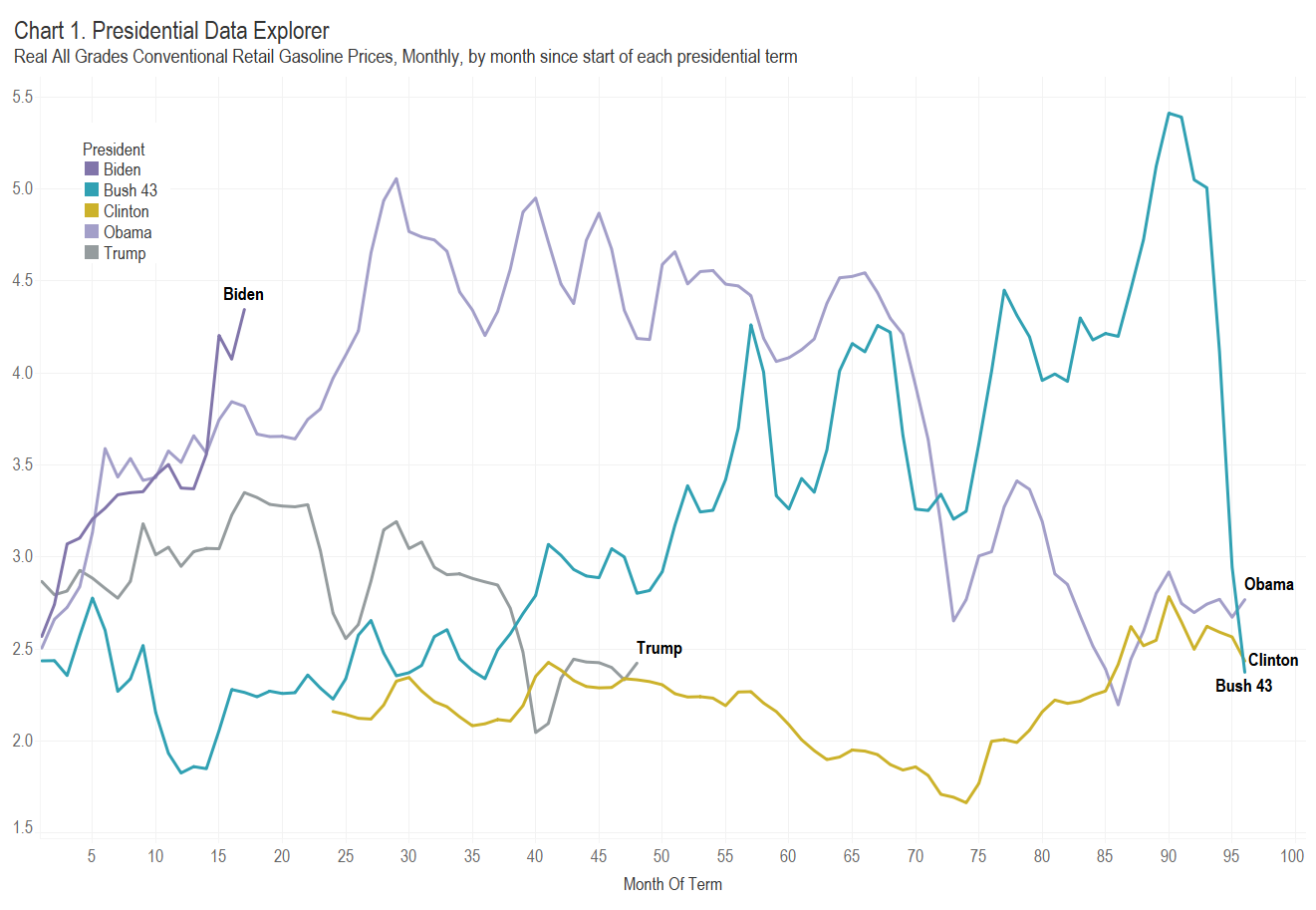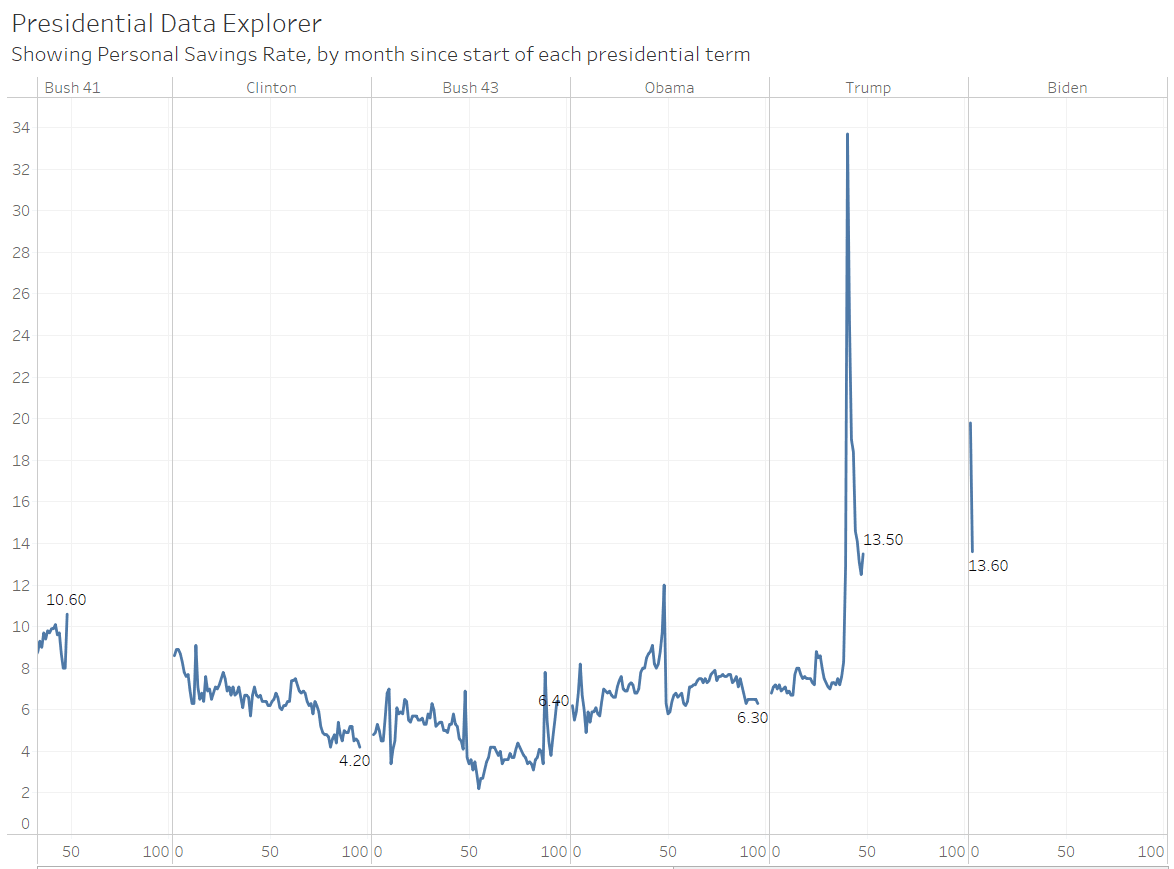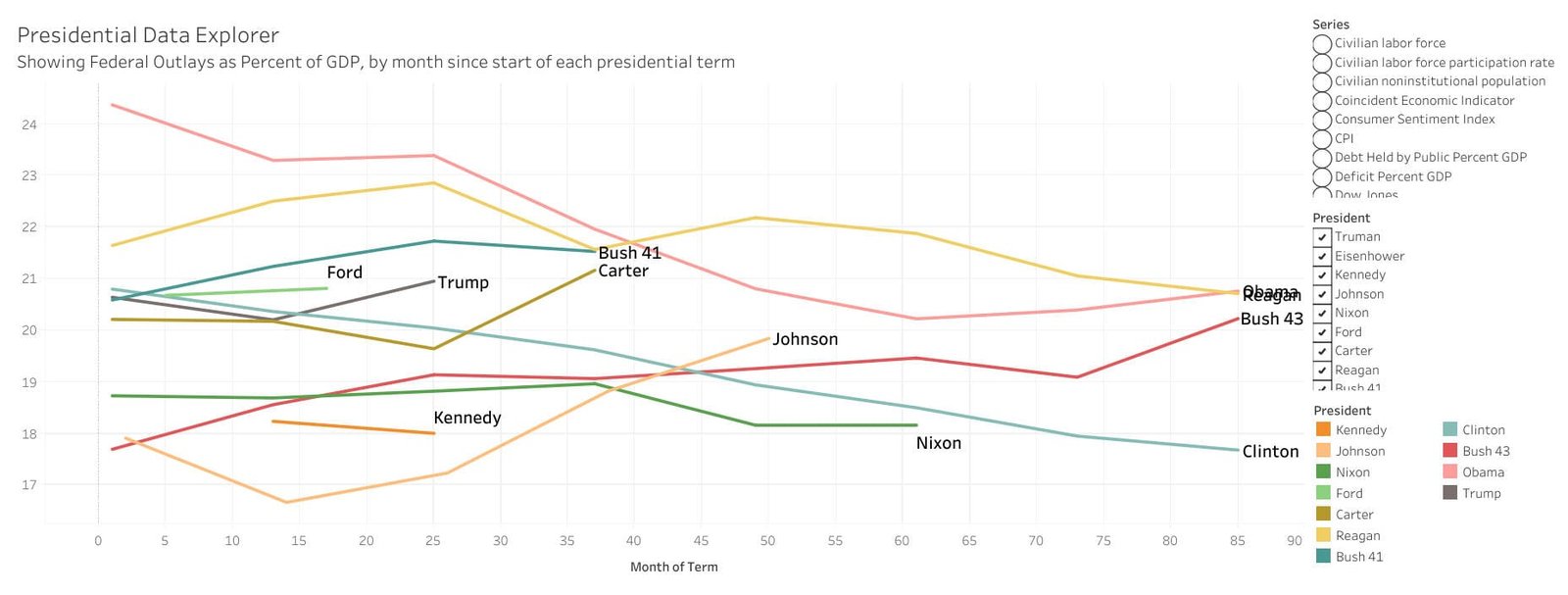Explore the economic record of presidents, starting with Harry S Truman. Updated with recent data. (more…)
Tag: United States President

Presidential Data Explorer Updated
Explore the economic record of presidents in an interactive visualization. (more…)

Updated: Presidential data explorer
Explore the economic record of presidents through the lens of data, with new views and updates.
To examine the record of presidents regarding economics, I gathered data from several sources and present it in an interactive visualization. Today the interactive visualization has been updated with current data and several new views. (more…)

Visualization: Kansas 2020 presidential election
An interactive visualization of the 2020 general election for president in Kansas, at the precinct level.

Proceed with the presidential transition
Further delay in starting the transition to the Biden administration harms Americans. Kansas Republican leaders, please get started.
I sincerely hope that the Republican federal officeholders who represent me, or who will soon represent me and my state, recognize that the presidential election is over, that Joe Biden won, and they encourage and help with a peaceful and effective transition to the new presidential administration.
While none of these leaders — Senator Pat Roberts, Senator Jerry Moran, Representative Ron Estes, Representative Roger Marshall, Representative-elect Jake LaTurner, and Representative-elect Tracey Mann — have the power to compel the transition to start, they can add their names to the small list of Republicans urging my president Donald J. Trump to get along with the nation’s business. Their leadership can convince other Republicans to follow.
If by some chance it turns out that my president Donald J. Trump won the election, we can simply stop the transition in its track. No permanent harm will have been done. But needlessly delaying the transition is harming national security and the health of Americans.
We now have a COVID-19 vaccine that will likely be approved for use. Its distribution involves overcoming large obstacles, both technical and human. The Biden administration must be ready to continue the efforts of the Trump administration with no delay or problems. Start the transition, please.
National security is at stake. The 9/11 Commission Report noted that the disputed presidential election of 2000 and the resultant short transition period was a problem:
“The dispute over the election and the 36-day delay cut in half the normal transition period. Given that a presidential election in the United States brings wholesale change in personnel, this loss of time hampered the new administration in identifying, recruiting, clearing, and obtaining Senate confirmation of key appointees.”
In its recommendations, the committee concluded this:
“Improve the Transitions between Administrations
“In chapter 6, we described the transition of 2000—2001. Beyond the policy issues we described, the new administration did not have its deputy cabinet officers in place until the spring of 2001, and the critical subcabinet officials were not confirmed until the summer—if then. In other words, the new administration—like others before it—did not have its team on the job until at least six months after it took office.
“Recommendation: Since a catastrophic attack could occur with little or no notice, we should minimize as much as possible the disruption of national security policymaking during the change of administrations by accelerating the process for national security appointments. We think the process could be improved significantly so transitions can work more effectively and allow new officials to assume their new responsibilities as quickly as possible.”
The Biden administration needs to be ready to seamlessly assume the duty of keeping us safe. Start the transition, please.

Pandemic’s influence on economy’s path
No matter who is president, a large challenge lies ahead, says the Federal Reserve.
As we wait to learn who will be our president, economists at the Federal Reserve Bank warn us of the challenges we need to overcome. In a statement released today:
The COVID-19 pandemic is causing tremendous human and economic hardship across the United States and around the world. Economic activity and employment have continued to recover but remain well below their levels at the beginning of the year. Weaker demand and earlier declines in oil prices have been holding down consumer price inflation. Overall financial conditions remain accommodative, in part reflecting policy measures to support the economy and the flow of credit to U.S. households and businesses.
The path of the economy will depend significantly on the course of the virus. The ongoing public health crisis will continue to weigh on economic activity, employment, and inflation in the near term, and poses considerable risks to the economic outlook over the medium term.

Presidential data explorer
Explore the economic record of presidents in an interactive visualization.
If you’re wondering how the records — economic, mostly — of presidents compare, here is the presidential data explorer.
I’ve gathered a variety of data from many sources and present it in an interactive visualization.
I know that some of the charts are crowded. But you can select which presidents to include, and you can click on one or more names for emphasis.
Click here to learn more about the data and access the visualization.

Example from the visualization. Click for larger 
Trump and Russia sanctions
President Donald J. Trump presents himself as tough on Russia, but he opposed and complained about almost all sanctions.
This year, John Bolton published The Room Where It Happened: A White House Memoir. It covers his time as National Security Advisor for the Trump Administration, which was from April 9, 2018 to September 10, 2019.
When the book was published, the editors of the conservative National Review questioned the timing of the book, but wrote: “Bolton is a longtime friend of this publication and we take his honesty as a given. Any credibility contest between him and Donald Trump is laughably lopsided.”
In this passage, Bolton lists sanctions imposed on Russia during the Trump Administration. But, he writes, “… almost all of them occasioned opposition, or at least extended grumbling and complaining, from Trump himself.”
The Trump Administration had imposed substantial new economic sanctions on Russian citizens and entities in 2017, related to the Crimea annexation, adding to what Obama had done, as well as extending other sanctions; closed the Russian consulates in San Francisco and Seattle; expelled more than sixty Russian intelligence agents (operating in the US as “diplomats”) after Moscow’s attack on the Skripals; imposed sanctions for violating the Chemical and Biological Weapons Control and Warfare Elimination Act, also required by the attack on the Skripals; sanctioned Russia’s Internet Research Agency, an arm of Russia’s cyber-offense machinery; and penalized over three dozen Russian officials for violations of US Syria-related sanctions. As new violations were uncovered, further sanctions were imposed on each person and corporate entity involved.
Trump touted these as major achievements, but almost all of them occasioned opposition, or at least extended grumbling and complaining, from Trump himself. One example involved the sanctions related to the chemical-weapons attack on the Skripals. This statute had only recently been used for the first time, after Kim Jong Un ordered his half brother murdered in Malaysia via chemical weapons, and after the Assad regime’s chemical weapons attacks in Syria. There was criticism that the sanctions imposed were not sweeping enough, but Trump objected to having any sanctions at all. Trump finally approved sanctions before the Helsinki summit but postponed announcing them until the summit ended. We explained to Trump that these sanctions were only the first in what was likely a series, since the applicable statute provided for ever-more-stringent sanctions if the accused nation did not provide convincing evidence it had given up chemical and/or biological weapons, including allowing international inspectors to verify compliance. No one believed Russia would do so. When Helsinki concluded, State announced the sanctions, since no new decision was required. Trump, upon hearing the news, wanted to rescind them. I wondered if this entire crisis was caused by Rand Paul’s recent visit to Moscow, which generated significant press coverage for him and where the Russians doubtless stressed that they were very unhappy about the sanctions. This was ironic, with libertarian politicians like Paul so worried about the Kremlin’s tender sensibilities. Hearing of the controversy, Mnuchin called Pompeo and me to blame us for not telling him about the new sanctions, which was inaccurate because the sanctions had previously gone through a National Security Council review process without objection from anyone. Within hours, Trump concluded he was relaxed about this particular decision, but he still thought we were being too tough on Putin. Trump told Pompeo to call Lavrov and say “some bureaucrat” had published the sanctions — a call that may or may not have ever taken place.
In addition to objecting to sanctions, Trump stopped an anodyne statement criticizing Russia on the tenth anniversary of its invasion of Georgia, a completely unforced error. Russia would have ignored it, but the Europeans noticed its absence and became even more concerned about American resolve. This was typical of Trump, who in June 2019 also blocked a draft statement on the thirtieth anniversary of the Tiananmen Square massacres and criticized the State Department for a press release issued before he knew about it. Trump seemed to think that criticizing the policies and actions of foreign governments made it harder for him to have good personal relations with their leaders. This was a reflection of his difficulty in separating personal from official relations. I’m not aware of any case where Russia or China refrained from criticizing the United States for fear of irritating our sensitive leaders.
Bolton, John. The Room Where It Happened: A White House Memoir. United States: Simon & Schuster, 2020.
A preview of the book is here: https://www.google.com/books/edition/The_Room_Where_It_Happened/QjTMDwAAQBAJ

Photo credit: www.kremlin.ru. 
Presidential approval
Explore and compare the approval ratings of presidents in this interactive visualization.
I’ve gathered presidential approval poll data and present it in an interactive visualization.
I present data in a table and a timeline. Then, I present several views based on the poll date as the number of days from the start of each presidential term.
To learn more about the data and access the interactive visualization, click here.

Example from the visualization. Click for larger.











